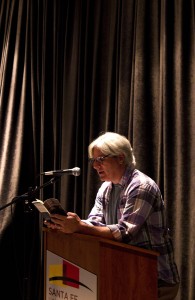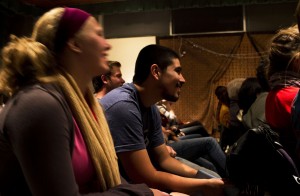Tags
Related Posts
Share This
Be Bold
LA Times book critic David Ulin is loathe to give advice. Or so he said, during a Q&A during his visit to the Santa Fe University of Art and Design last week. However, the entirety of Ulin’s visit to SFUAD was an inadvertent how-to course for writers.
First and foremost, says Ulin, “Writing is a practice, not a religion!” Ulin learned this by pursuing a job that challenges his writing skills daily. Ulin’s job and his personal writing are a part of the same world: Writing criticism is a “writerly practice,” and he works each day to craft reviews that are “also satisfying reading experiences.”
That said, writing on a deadline, another aspect of Ulin’s job, “removes the preciousness” from the work. With a new story due every day, it is imperative for a writer to be able to crank words out and let them go as soon as the final draft goes to the editor.
This is coming from a man who worked on a novel for nearly thirty years before he scrapped it, though he could have worked on it until he was eighty.
“It’s important to remember that all writers are a part of a conversation,” says Ulin, “and if nobody ever sees your work, you’re not really taking part.”
Which leads to another recommendation: Get your work out there. Ulin is a private writer. He never reads works in progress at public readings. Yet that is exactly what he did in O’Shaughnessy last week. “I keep sharing this piece at readings,” he said, “as if to light a fire under my ass to finish it.”
Having a fire under the ass is important for getting work done, and one way to help keep it lit is to say “yes” to everything. The possibility not only of being published, but also of writing something meaningful, only increases when “yes” is always a writer’s answer.
Working as a freelancer, Ulin got an assignment to do a piece on aromatherapy massage for Self Magazine. Ulin showed up for a treatment at the Beverly Wilshire Hotel on the same day that the 1992 LA Riots broke out. When he came out of the therapeutic massage, the riots were in full motion and he found himself amidst the horror-struck rich and retired, whose poolside cocktails had been interrupted. Ulin, who never could have placed himself under these strange circumstances intentionally, wrote an in-depth essay from the satirical lens of the situation he found himself in.
“The magazine didn’t publish it,” he explains, “but I got a great essay out of it—just because I was willing to get paid to go get an aromatherapy massage and write about it.”
Flexibility in genre is more and more useful as the vehicle for the written word shifts to the internet. Alt-weeklies, a common starting point for professional writers, are gradually being replaced by online publications like Nervous Breakdown, The Rumpus and The Millions. These publications don’t box writers into specific genres, which opens up the opportunity, even the expectation, that writers explore a variety styles and topics in their work.
Just as much as it is important to say “yes” to unusual opportunities, it is important to be able to hear the word “no” without being paralyzed. “Don’t take no for an answer,” said Ulin again and again.
Writers hear the word “no” frequently, sometimes from the moment they decide to ‘be writers.’ When Ulin told his high school counselor that he wanted to be a writer the response was, “Yes, but what do you really want to do?”
“I told him that writing must be a real profession,” says Ulin, “because whenever I went to the bookstore there were still shelves full of books and I knew somebody must have written them!”
What Ulin learned as he did pursue a career as a writer, was that the reward for writing is the work itself.
“The joy of the work,” says Ulin, “is the only reason to do it. The other rewards are unpredictable and fleeting, scattershot and indefinable.” There is no day as disappointing as the day a writer’s book gets published, for example, “because the world just keeps on going on like nothing happened—you still have to take out the trash, you still have to walk the dog, you still have to go to work… nothing changes!” Indeed, not much changes on publication day even if you are about to be counted amidst the canon of “real” writers whose works line the shelves of bookstores.
“Writing and reading,” says Ulin, “are the only reasons to be breathing—except family, of course.” Being able to read and write for a living, then, is the reward.
At the same time, however, it is important for a writer, like any other professional, to get to know people in the industry. Writing art or literature criticism specifically has given Ulin the opportunity to meet writers personally.
“When I interview people for work,” says Ulin, “the first half of my interview is for my article, and the second half is for myself. It’s like my PhD on how-to-write: I just grill them on how they do it!”
Knowing editors, writers and publishers who’s work you respect, however, goes two ways. It may seem obvious to say that writers should write work that will also be appreciated and respected by their peers, but Ulin emphasizes this in the most basic way:
“Edit your work ruthlessly,” Ulin exclaims. How? Use commas sparingly, use first person only when absolutely necessary, be aware of your ticks (Ulin’s are ‘after all,’ ‘of course,’ and ‘and yet’), cut and streamline, and of course, read your work out loud.
“Your dog,” offers Ulin, “is always a safe bet. No matter what you read he’ll look at you like it’s absolutely wonderful.”
The most important aspect of editing and revising is “scaling back, curating a space for your reader to make connections themselves.” In order for the connections a reader is supposedly making to exist, the writing has to have depth.
“Dive into, explore, and write through whatever makes you uncomfortable, whatever is uncertain,” says Ulin, “because that is what makes real art, what makes it interesting, what makes it universal.” Ulin says that of all the books he reads, it is unbearable to read work that is “faking it,” trying to please the reader.
“There’s the feel-good thing and there’s the real thing,” says Ulin, “and sometimes they’re simultaneous but sometimes they’re not.” Writing about the “real” issue at hand requires a great deal of boldness. It requires that a writer turn inward and wrestle out “whatever it is that they personally have to wrestle with.”
“Scare yourself,” says Ulin. “Take your clothes off in public! Well, you know, figuratively.”








 Jackalope Magazine is the student magazine of Santa Fe University of Art and Design. Building on the interdisciplinary nature of our education, we aim to showcase the talent of our university and character of our city.
Jackalope Magazine is the student magazine of Santa Fe University of Art and Design. Building on the interdisciplinary nature of our education, we aim to showcase the talent of our university and character of our city.
Recent Comments